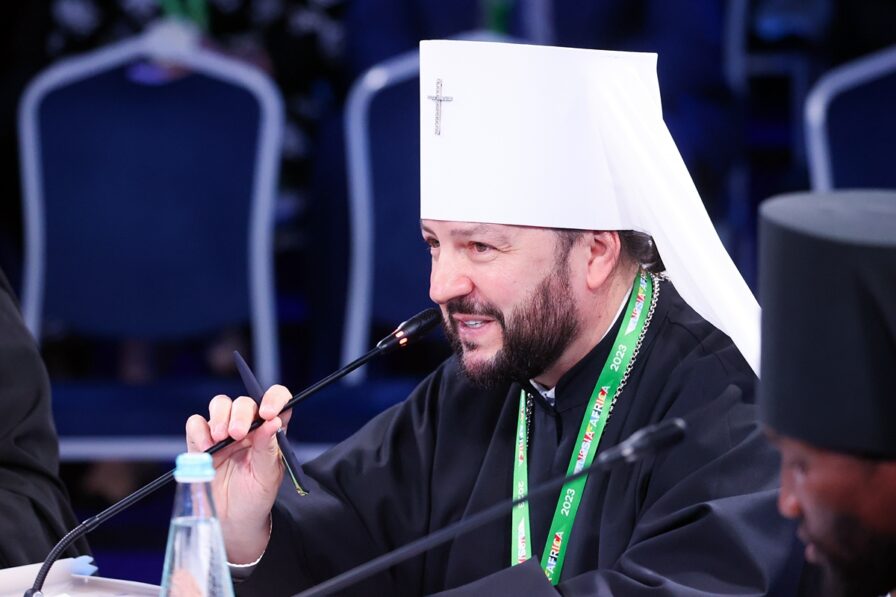
On 28th July 2023, as part of the Russia–Africa Economic and Humanitarian Forum of the Second Russia–Africa Summit that took place in St. Petersburg, the Patriarchal Exarchate of Africa held a plenary session on Religious Component of African Countries’ Development in the Dynamic World.
Metropolitan Leonid of Klin, Patriarchal Exarch of Africa, delivered a keynote address, in which he pointed out the following:
1.Religion plays a much greater role in Africa than in other parts of the world inasmuch as Africans as a whole are the most religious people on the planet. Percentage of non-believers is the lowest in African countries, while in many of them believers make up almost 100% of the population (based on results of a sociological research published by The Telegraph https://nonews.co/directory/lists/countries/relgiousness). Religion’s importance and an impact it has on social and political processes are considerable. Therefore, religion can provide a basis for establishing longstanding close relationships with Africa.
2.The majority of Africans profess Christianity. Historically, people in Africa were one of the first to make this worldview choice. Christ Himself and His Most Pure Mother lived in Egypt and then Apostle Mark founded a great Church there. Ethiopia was among the first countries to embrace Christianity nationwide. Churches of North Africa and Nubia used to play a significant role and were renowned in history. Their heritage is still living, nourishing us, present-day Christians. As for Egypt and Ethiopia, along with Eritrea, authentic African Churches flourish there to this day.
3.Roman Catholicism and Protestantism – Western versions of Christianity that came to the continent with colonialists – also contributed to Africa’s religious diversity. Later, there appeared a lot of groups on the continent that deviated from the Western Christian Churches and developed their own teachings which were a mix of Christianity and local traditions. That was how Africans manifested their determination to find their own ways of confessing faith in Christ without any affiliation with the Churches that disgraced themselves by their support for colonialists and involvement in slave trade and intertribal conflicts, such as the genocide in Rwanda, for instance. In recent years, Africans’ disappointment at the Western Churches has grown as those Churches have a tendency of rejecting the Biblical moral teaching in favour of homosexuality, transgenderism, feminism, etc.
4.The establishment of the African Exarchate of the Russian Orthodox Church produced a surge of interest among people in many African countries since Orthodoxy conforms to many of their aspirations, having no such problems as the Western Churches have and being the primordial, true Church of Christ.
5.While the Greek Orthodox Church of Alexandria has centuries-old history of presence on the continent, it has almost always been focusing on taking care of the Greek population. It was only in the 20th century that it started to grow, incorporating some African uncanonical groups that had already by the time associated themselves with Orthodoxy. However, despite isolated cases of success, in general the Church of Alexandria fell short of Africans’ expectations and disappointed many of them as it channeled most of its efforts into propagating the so-called Hellinism and Greek phyletism, while carrying out pastoral work in disregard of African cultures uniqueness.
6.The history of the Russian Orthodox Church’s presence in Africa goes down in centuries. As His Holiness Patriarch Kirill mentioned in his speech yesterday, first temporary Russian churches appeared in the territory of Abyssinia as far back as the 19th century. In 1914, a permanent Russian Orthodox parish was established in Egypt; in the 1920s, Russian parishes opened in Tunisia, Algeria and Morocco. Since the mid-20th century, our Church tried to maintain its presence in Africa by means of cooperation with the Orthodox Church of Alexandria. But it became impossible after the Patriarch of Alexandria, acting under the pressure of anti-Russia external forces, had recognized the Ukrainian schismatics and entered into communion with them.
7.What we are witnessing now is of historic importance – the number of followers of the Russian Orthodoxy on the African continent is soaring. For one and a half years since the establishment of the Patriarchal Exarchate of Africa, the number of African parishes of the Russian Orthodox Church has increased from five to two hundred, and the number of countries where these parishes opened have grown from four to twenty-five. Africans make up the overwhelming majority among the clergy and parishioners. The Russian Orthodox Church is becoming a bridge that joins our countries and peoples, enabling us to show our best selves to one another.
In addition, it should be noted that methods of the so-called proselytism and expansionism are alien to the Russian Orthodox Church, which opens its doors to everyone who thirsts for spiritual renewal offered by the Orthodox Christian tradition. At the same time, our Church is ready to cooperate with other confessions and religious communities. Our cooperation may develop in various spheres, including in upholding traditional principles of human life, morality and religious freedoms, as well as in peace-making and humanitarian work. We actively cooperate with the Coptic and Ethiopian Churches, different Muslim organizations, representatives of Catholic and Protestant communities, along with interfaith and inter-Christian councils in many countries. I believe that our experience of interfaith cooperation with Muslims and representatives of other religions in Russia and other countries under our canonical jurisdiction will be useful, and I greet esteemed Mufti Albir Krganov, head of the Spiritual Assembly of Muslims of Russia, who is present here and will tell more about it.
It is worth noting that not everything is good in the African political life. There are conflicts, and often a religious factor is used as an instrument for their escalation. Unfortunately, Christians suffer from persecution in a number of African countries. Peace is what many countries and peoples really need today, including on the African continent, and the Russian Orthodox Church is coming to Africa with the glad tidings of peace, neighbourliness and mutual understanding.
Patriarchal Exarchate of Africa